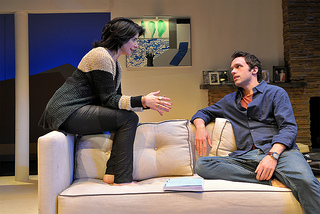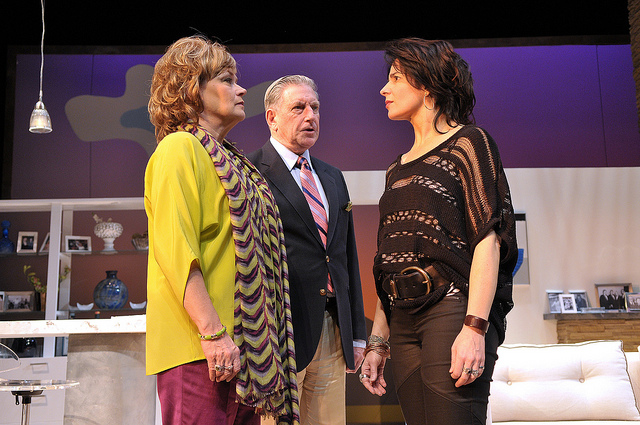Theater Review: Another View of “Other Desert Cities”
Life can be found under any stone, in any crack in the sidewalk. But I admit I yearn for being taken on a grander voyage, higher, deeper than any sitcom can take me.
Other Desert Cities by Jon Robin Baitz. Directed by Scott Edmiston. Set by Janie E. Howland. Costumes by Charles Schoonmaker. Lighting by Karen Perlow. Staged by SpeakEasy Stage Company. At Stanford Calderwood Pavilion in the Boston Center for the Arts, Boston, MA, through February 9.
By Peter Adrian-Cohen

Anne Gottlieb and Christopher M. Smith in SpeakEasy Stage’s production of OTHER DESERT CITIES. Photo: Craig Bailey/Perspective Photo
There isn’t a single original thought in this play; the plot is predictable; the set leaves little to the imagination.
AND YET.
And yet, this evening of theater drew me in. And the longer it lasted, the more completely I was drawn in.
The most obvious reason is that Other Desert Cities has a very good cast. The actors work in total concentration—you can feel it; the audience feels it, and they are as quiet and concentrated as the cast. The moments when emotions finally get the better of everyone are carefully built up and thus believable; they are of just the right intensity, never veering into melodrama.
What you get here is a sitcom that does honor to its genre.
But it is this genre—the sitcom—that also limits the evening: the slice of life-perspective. Life documented instead of being more deeply understood. We all know the feeling: We’re being invited to the house of trusted and trusting friends; We are the ideal captive audience and off our friends go and before we know it we’re in this very heavy family therapy session. Now I don’t mind doing this for good friends because they have done it for me—and will do it again. Life is not symmetrical, and friendship is even less.
But, for godssake, this is not family-therapy, it is THEATER. I want more than a slice of life. I want more than entertainment; I want to be taken to a place—material and emotional—that I have not been to before. Instead I find myself involved in the classical family-quarrel that we have seen, on stage and on TV, a million times before. If we’re taken down this road, for heavenssake, take us to a new place. What if Polonius, seeing off Laertes (Hamlet, Act 1, Scene 3) simply said to him “Take care” instead of “This above all: to thine own self be true, And it must follow, as the night the day, Thou canst not then be false to any man. Farewell.”
You get my drift?

Karen MacDonald, Munson Hicks, and Anne Gottlieb face off in the SpeakEasy Stage production of OTHER DESERT CITIES. Photo: Craig Bailey/Perspective Photo.
You can argue, of course: Why does drama always have to be about exceptional men (and women) in exceptional circumstances? Well, consider the alternative: small people living average lives. Is that what wakes us from our slumber? Is that what makes us grow? The fact is that if you start with little you get little.
I doff my hat to the cast and director who pull this baby off. As you can feel from my review, they remind me of the power of good theater-craft: good acting and good directing.
It’s true—life can be found under any stone, in any crack in the sidewalk. But I admit I yearn for being taken on a grander voyage, higher, deeper than any sitcom can take me.
Bill Marx’s Fuse review of Other Desert Cities

I agree with this. But more… every character seems to have no underlying substance, cliche beyond belief. I have only walked out on one other play in my life (and I am of age to collect social security), but my companion was ready to kill herself by the end of the first act. Words like “dreadful” seem don’t feel adequate.
If you want to consider, how about Polly, who is the very embodiment of the of the cliche “assimilated Jew,” the country club, Californian. And shrewish, too. These are tiresome people, mostly because of the words they’ve been given to exclaim. This is no Virginia Woolf. And despite the pretense of pain and angst, it really felt much more like On Golden Pond. Did we learn /anything/ from this?
In sum, it felt like the work of an earnest young college student, who, being aware of the swirl of cultural and family division in the world, and, who, being an English major, would really love to be a playwright, but, unfortunately, has nothing really to say.